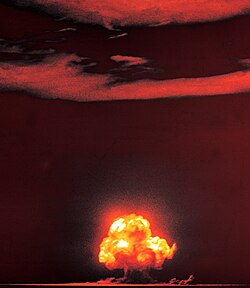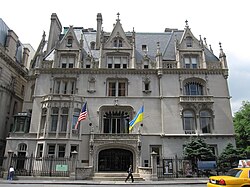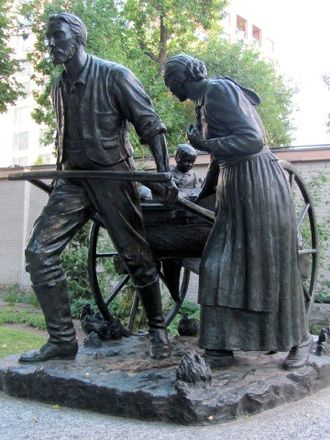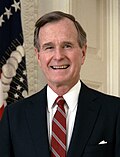Portal:United States
Introduction

| |

| |
Did you know (auto-generated) -

- ... that Raymond Bushland and Edward F. Knipling won the 1992 World Food Prize for developing the sterile insect technique which eliminated parasitic screw-worms from the United States?
- ... that supply-side progressivism is a response to rising costs of housing, healthcare, and other essential goods in the United States?
- ... that the Hosanna Meeting House was a station on the Underground Railroad and had a secret chamber to conceal fugitive slaves beneath its floorboards?
- ... that Donald Trump and his attorneys John Eastman and Rudy Giuliani spoke to some 300 Republican state legislators in an effort to overturn the 2020 United States presidential election?
- ... that college debates in the United States were originally conducted entirely in Latin?
- ... that the Hawaii Civil Liberties Committee was designated as a Communist front by the House Un-American Activities Committee?
- ... that The Cormac McCarthy Journal is one of the few academic journals about a specific author from the United States founded while its subject was alive?
- ... that, inspired by the short story "Qingfeng", Mao Zedong likened the United States to a ghost?
Selected society biography -
Born into a wealthy, established family in Milton, Massachusetts, Bush was raised in Greenwich, Connecticut. He attended Phillips Academy and served as a pilot in the United States Navy Reserve during World War II before graduating from Yale and moving to West Texas, where he established oil company Zapata Corporation. Following an unsuccessful run for the United States Senate in 1964, he was elected to represent Texas's 7th congressional district in 1966. President Richard Nixon appointed Bush as the ambassador to the United Nations in 1971 and as chairman of the Republican National Committee in 1973. President Gerald Ford appointed him as the chief of the Liaison Office to the People's Republic of China in 1974 and as the director of Central Intelligence in 1976. Bush ran for president in 1980 but was defeated in the Republican presidential primaries by Reagan, who then selected Bush as his vice presidential running mate. In the 1988 presidential election, Bush defeated Democrat Michael Dukakis.
Foreign policy drove Bush's presidency as he navigated the final years of the Cold War and played a key role in the reunification of Germany. He presided over the invasion of Panama and the Gulf War, ending the Iraqi occupation of Kuwait in the latter conflict. Though the agreement was not ratified until after he left office, Bush negotiated and signed the North American Free Trade Agreement, which created a trade bloc consisting of the United States, Canada and Mexico. Domestically, Bush reneged on a 1988 campaign promise by enacting legislation to raise taxes to justify reducing the budget deficit. He championed and signed three pieces of bipartisan legislation in 1990, the Americans with Disabilities Act, the Immigration Act and the Clean Air Act Amendments. He also appointed David Souter and Clarence Thomas to the Supreme Court. Bush lost the 1992 presidential election to Democrat Bill Clinton following an economic recession, his turnaround on his tax promise, and the decreased emphasis of foreign policy in a post–Cold War political climate. (Full article...)
Selected image -
Selected culture biography -
Witherspoon married actor and Cruel Intentions co-star Ryan Phillippe in 1999; they have two children, Ava and Deacon. The couple separated at the end of 2006 and divorced in October 2007. Witherspoon owns a production company, Type A Films, and she is actively involved in children's and women's advocacy organizations. She serves on the board of the Children's Defense Fund (CDF), and was named Global Ambassador of Avon Products in 2007, serving as honorary chair of the charitable Avon Foundation.
Selected location -
Located on the western banks of the Red River of the North in an extremely flat region known as the Red River Valley, the city is prone to flooding and was struck by the devastating Red River Flood of 1997. Grand Forks was founded in 1870 by steamboat captain Alexander Griggs and incorporated on February 22, 1881. Its location at the fork of the Red River and the Red Lake River gives the city its name.
Historically dependent on local agriculture, the city's economy now encompasses higher education, defense, health care, manufacturing, food processing, and scientific research. Grand Forks is served by Grand Forks International Airport and Grand Forks Air Force Base, while the city's University of North Dakota is the largest and oldest institution of higher education in the state. The Alerus Center host athletic and other events, while the North Dakota Museum of Art and Chester Fritz Auditorium are the city's largest cultural venues.
Selected quote -
Anniversaries for April 23
- 1635 – The first public school in the United States, Boston Latin School (pictured), is founded in Boston, Massachusetts.
- 1791 – James Buchanan, 15th President of the United States, is born.
- 1910 – Theodore Roosevelt makes his The Man in the Arena speech.
- 1968 – Student protesting the Vietnam War take over administration buildings and shut down Columbia University in New York City.
- 1985 – Coca-Cola changes its formula and releases New Coke. The response is overwhelmingly negative, and the original formula is back on the market in less than 3 months.
Selected cuisines, dishes and foods -
The cuisine of Philadelphia was shaped largely by the city's mixture of ethnicities, available foodstuffs and history. Certain foods have become associated with the city. (Full article...)
Selected panorama -
View from near the summit of Mount Ellinor in the Olympic National Forest of Washington, showing Mount Washington on the right, Puget Sound on the left, and various other landmarks.
More did you know? -
- ... that the first United States postage stamp that depicted a space vehicle (pictured) was issued in 1948?
- ... that the Federalists of New England did not support the War of 1812, so Captain Oliver Filley of Connecticut, who built the Oliver Filley House, commanded 40 militiamen under state control?
- ... that National Labor Relations Board Chief Economist David J. Saposs was accused of being a Communist, and Congress defunded his position and division in October 1940?
Topics
Categories
Featured content
List articles
|
Culture Education Economy |
Geography Government
History |
Law Media Natural history |
People Protected areas Religion Transportation |
Tasks
Featured article candidatesTotal pages in content type is 3 Featured list candidatesTotal pages in content type is 5 Good article nominees
Total pages in content type is 109 | ||||
|
To create
To discuss on Articles for deletion
To expand To destub |
Assessment requests New articles Most Popular pages To find images |
Maintenance and cleanup
Other issues
| ||
Related portals
State-related
Region or city-related
Sports-related
Transportation-related
Other US-related
Nearby areas
WikiProjects
Associated Wikimedia
The following Wikimedia Foundation sister projects provide more on this subject:
-
Commons
Free media repository -
Wikibooks
Free textbooks and manuals -
Wikidata
Free knowledge base -
Wikinews
Free-content news -
Wikiquote
Collection of quotations -
Wikisource
Free-content library -
Wikiversity
Free learning tools -
Wikivoyage
Free travel guide -
Wiktionary
Dictionary and thesaurus
More portals



































































